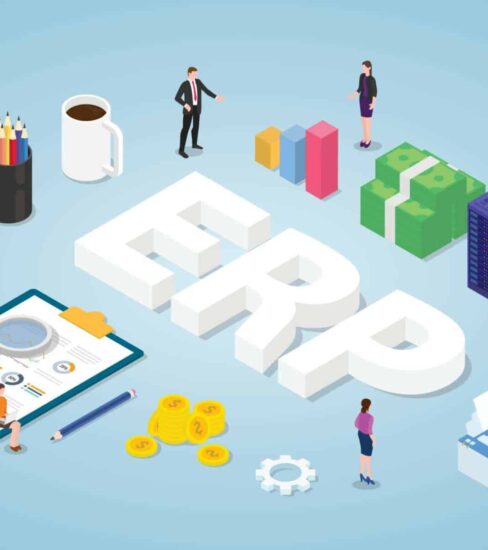Another year has passed, and it's time for us to glance into the future and see what's on the horizon for ERP software and enterprise technology in 2024. The IT trends we expect will naturally progress the waves of digital transformation set in previous years.
As inflation, recession, immigration, and increased demand stress the global supply chain and expose new constraints; disruption becomes a dominant and permanent component of our reality. Organizations continue to adapt to the new business management standards, striving for stringent business continuity and risk management strategies.
To stay relevant and competitive in a constantly changing landscape, companies increasingly rely on ERP systems to manage their operations. Today more than ever, organizations are required to rapidly adapt the way they manage their entire business operations to meet their strategic business goals.
8 of the biggest ERP trends we'll continue to see in 2024 are:
The Expansion of Industry-Specific Solutions
Best-of-breed systems outshine enterprise-wide ones. The realization that one size cannot fit all dawns on the ERP market. Leading ERP providers are embracing the notion that every industry is unique, and today, they offer more industry-specific functionalities and features, which means there are fewer costs associated with customization, leading to faster implementation and deployment.
As a result, we've seen a continued expansion of ERP into new sectors such as retail and construction. Resource planning solutions tailored to specific industry verticals are a driving force for today's ecosystem of data context. Be it different prospects offered to different industries or specific categories within one industry.
Taking the vertical approach drastically reduces the customization requirements, promotes better use of resources, and helps businesses achieve better integration with different processes.
Zephyr Chan, a Growth Marketer & Founder of Better Marketer, said, "A one-size-fits-all strategy falls short of the expectations of business and technology executives due to the different demands of each sector. As a result, ERP solutions are emerging that provide features tailored to particular industry sectors. Industry ERP solutions are becoming more and more popular with CIOs. Emerging vendors have identified their specialty sectors."
"In the past, CIOs would introduce an ERP system and progressively expand it to all of the enterprise's important business divisions. However, the SaaS revolution and growing digitalization are forcing IT decision-makers to change their strategy. CIOs choose a cloud ERP system from a top vendor for a key function like finance since it satisfies their needs, but they choose best-of-breed point solutions for other areas." Commented Jamie Penney, CEO of ShoppingFoodie.
Customization Replacing Standardization.
When it comes to ERP, operational differences are what determine the organization's distinct competitive advantage.
Today's organizations are characterized by unique flavors and nuances. A customizable ERP is a system designed with tremendous flexibility capabilities that allow you to deliver modules that perfectly fit unique business processes.
Traditional ERP solutions often require drastic changes to an organization's business flow. However, customizable ERP solutions can be tailored to ensure that an organization's workflow or business process remains unchanged. Customizable workflows, reports, and processes Reduce the learning curve, promote easy adoption, have minimal impact on business flow, and offer a massive productivity boost.
Emphasis on Integration.
With the rise in cloud/SaaS ERP adoption, integration using standard APIs is the common proverb.
An ERP that allows you the freedom to integrate with third-party applications is crucial for technological independence.
Customizable ERP solutions offer access to APIs and deliver the ability to integrate niche third-party solutions that allow companies to easily add or remove features to their ERP solutions and have greater control over both development & implementation.
"Enterprises are attempting to benefit from the introduction of next-generation technologies like IoT, analytics, and AI to grow their businesses. Leading ERP providers embrace this trend by integrating their products with these cutting-edge technologies, and IT executives are doing the same. It is now simple to combine an ERP solution with other satellite applications because of the availability of web services and JSON." James Angel, Co-Founder of DYL.
Cloud-First Approach To ERP
Cloud-based ERP still ranks as one of the most revolutionary trends, even though it is not a new one. Cloud computing introduced a new world of ERP, enabling SaaS options that drive more efficient work practices, save time, reduce the total cost of ownership, and help companies change how they work.
Open, flexible, and scalable cloud applications led the market to be dominated by SaaS ERP solutions. Many organizations that still use on-premise ERP are starting to understand how and why they are left behind. Highlighted by the pandemic, operational limitations, from inflexibility and costly scaling to lack of innovation and partial collaboration, forced many businesses to operate remotely, deeming on-premise solutions obsolete.
Many more companies are now moving massive amounts of ERP data into cloud storage because their obvious advantages have evaporated those reservations. As a result, the cloud computing market size is projected to reach USD 791.48 billion by 2028, exhibiting a CAGR of 17.9%.
Mobile ERP
ERP on the go is an ever-growing trend as today's workforce is increasingly mobile and adaptive. That's why it's no surprise that one of the biggest trends in ERP for 2024 is an increased focus on mobile management solutions.
Today, more and more organizations are onboarding mobile ERP, which is fast becoming a necessary operational tool. Mobile ERP solutions drive system visibility and accessibility companywide, accelerate business processes, boost productivity, and save time, resources, and costs. Mobile ERP apps are designed to power operations "on the go," with apps including mobile CRM, proof of delivery, warehouse, point-of-sale (POS), purchase approval, employee attendance apps, and more.
Machine Learning & AI.
2024 will see a further shift into the era of automation and embracing machine learning and AI in ERP. In a business world dominated by a culture of instant gratification, process automation tips the scales in favor of those who use it to "achieve more with less."
In 2024 and beyond, the growing AI trend will echo across all ERP features, including industry-specific solutions, such as manufacturing and distribution. Artificial intelligence technologies, including machine learning, are helping organizations draw additional value from the ever-growing volumes of collected data. AI continues to empower companies to gather new, actionable insights, enhance their operational processes, and best use their reams of business data.
Blockchain Integration in ERP
Blockchain technology offers unparalleled security and transparency for transactions. In 2024, we anticipate seeing an increasing number of ERP providers integrating blockchain technology, especially in sectors where traceability and transparency are paramount, like supply chain, finance, and manufacturing. This integration will enhance trust among stakeholders, ensure the authenticity of transactions, and reduce instances of fraud and data tampering.
Human Experience
Beyond the User Experience (UX), there's a rising trend focusing on the broader Human Experience (HX). While UX deals with the user interface and interaction, HX encompasses the entire user ecosystem, including the emotional, physical, and cognitive connection with the system. ERP providers are beginning to understand that for successful software adoption, it's essential to focus not just on how the system looks or operates but on how it feels for the users, putting a bigger focus on the overall user experience.
Conclusion
The ERP evolution is driven by the industry's race to increase efficiency and revolutionize how businesses manage their operations. In 2024, we'll continue seeing a significant change in the ERP solutions' key features and deployment methods. ERP will continue to evolve and create new technologies and operational workflows to stay ahead of the game.


